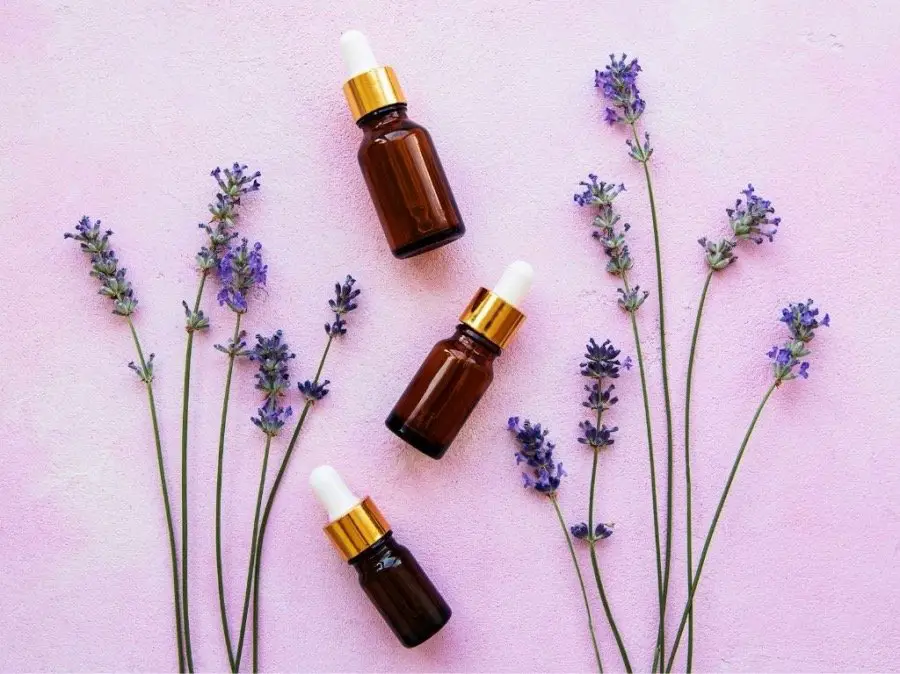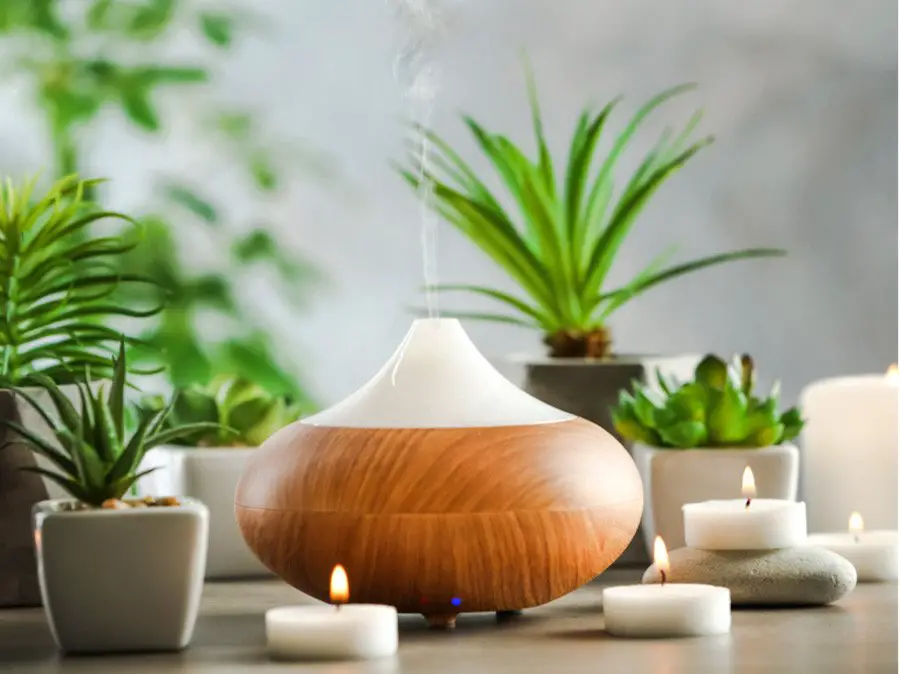Essential oil diffusers and scented candles are both great tools for aromatherapy. I’ve used them both extensively over the years with great results. But are diffusers better than candles or is it the other way around?
In general, essential oil diffusers are better than candles in terms of long-term costs, safety for children and pets, and ensuring the oils’ quality and purity. Scented candles score better in terms of aesthetics and ease of initial setup. However, the type and quality of the products you choose within each category can significantly alter the scores.
When quality and safety are guaranteed, you can go with the option you like the most.
Follow along as I go into great detail about the characteristics of essential oil diffusers and aromatherapy candles. I’ll offer my findings and thoughts regarding their safety, ingredients, cost, aesthetics, fragrance persistence, aromatherapy efficiency, and ease-of-use. I trust this analysis will help you make an informed decision on which product to choose.
Table of Contents
Safety Considerations
Sometimes, you just need your home to be a relaxing haven. And nothing sets the mood for relaxation like some good old aromatherapy. Whether you choose an oil diffuser or a candle, you can certainly find fragrances that can improve your mental capacities, mood, feelings, and most of all, help you relax.

Sure, you want your home to smell divine but not at the expense of your safety or that of your loved ones. If either of these two tools fails in meeting this expectation – they lose. And, in fact, there are some safety concerns to consider when choosing between diffusers and candles and the right product within each category.
Having a burning candle in your home unsupervised is hazardous, especially if you have a pet or children. You have to be mindful of the candle, and that’s not good for relaxing. I mean, if you want to keep your mind off responsibilities while enjoying the sweetness of the candle scent, then maybe a diffuser is a better option.
It is also impractical to have a candle burning through the night. It is, after all, an open flame. It can cause a fire when you are deep in slumberland. Furthermore, if you want a dark room, that flame is going to be a hindrance.
Chemical Vs. Natural
There is such a thing as synthetic fragrances. You probably do not want to inhale artificial perfumes because they are chemicals that your body does not need. For a diffuser, you are guaranteed that the scent you are inhaling is from the essential oil. Although let us be real, your essential oil has to be pure too.
Not all products sold as essential oils are extracted from plants. Some are just manufactured in laboratories.
Let me rephrase – if you have natural essential oils in your diffuser, you are inhaling the authentic stuff. I recommend researching your oils. Find out which ones are natural and which ones are plain old chemicals. Once you find natural oils, you have hit the jackpot.
By the way, if you are interested in knowing more about ultrasonic aromatherapy diffusers, check out my article ‘What is An Ultrasonic Aromatherapy Diffuser? And Do You Need One?.’

Some candles have chemical scents as well. Aside from the unnatural fragrance, candles may still contain synthetic dyes and petroleum-based wax. Such chemicals might not be safe to breathe at all.
For instance, paraffin wax is thought to break down to release toluene. Toulene has psychoactive effects. It speeds your heart rate and may interfere with your mind, feelings, awareness, and mood.
You could choose a possibly healthier variety of candles if diffusers are not your thing: you can get candles made of soy wax or beeswax instead of paraffin or blends. Soy wax comes from soybeans. It’s not known to give off carcinogenic by-products when ignited like paraffin wax. It also burns longer and produces less soot.
If you are looking for some good quality soy wax scented candles, check out this amazing set on Amazon.
Similarly, beeswax is produced by honey bees. It’s not known to break down into harmful chemicals when burned.
Always check your candle ingredients before being enchanted by its smell! Your healthy relaxed mind will thank you for it.
Cost
Admittingly, we all want our houses to smell like cake while saving a buck or two. Getting the cheapest yet effective aroma dispenser means saving your wallet. In the aromatherapy diffuser vs. candles debate, the rate of replacement determines expense.
You buy an electric diffuser once but have to buy the essential oils frequently. A diffuser, on average costs between $15 to $50. A $50 diffuser can come with a set of essential oils. If you are looking for an inexpensive set of essential oils for your diffuser, you may want to check out this one on Amazon.
The prices of scented candles vary considerably. You can find good candles for as little as $4, but the fancier ones can cost more than $15. You may need to buy many candles depending on the size of your room or the setting you want to achieve. You can save a couple of bucks buying a whole set like this one.

An average candle lasts for about 40 hours, but essential oils last longer. A drop of essential oil has a highly concentrated scent. When diluted with water in the diffuser, the oil gives up to 16 hours of aroma.
Of course, electric diffusers also incur operating costs. The diffuser depends on electricity to dispense aroma. Electricity does not come cheap. The oil diffuser is another energy-consuming gadget in your home that operates full time. If you are part of the minimal energy consumption group, this gadget may not be for you.
Aesthetics
Close your eyes and picture a warm bath with bubbles set up just right. Slow music playing in the background and your aromatic candles beautifully complementing the low light ambiance. Now open your eyes. The smell and look of your imaginative bathroom are straight out of a movie scene, right? A good movie – for that matter.

Sorry, diffusers have no place in movie scenes. Unless it comes with a light changing feature, but that is what dim lights are for, right? When it comes to aesthetics, candles take the win. On the downside, after that beautiful long soak, there is wax and soot to remove. However, I think the experience is completely worth it.
Fragrance Persistence
The efficacy of a diffuser is in its uniformity in spreading your essential oil perfume. The odor also lingers longer in the room and, in the case of nebulizing diffusers, increases in concentration with every release. As for the candle, scent distribution depends heavily on the quality of the candle.
If your candle is made from petroleum wax, the by-products of the burning candle emit smells that interfere with the fragrance.
Also, the scents from candles do not linger around for long. You will need to burn that candle for the odor to persist.
Aromatherapy Effectiveness
The effectiveness of aromatherapy lies in the purity and concentration of the fragrance. Unfortunately for many candles, there is a lot of impurities mixed with the scent. Furthermore, the odor can be laced with synthetic chemicals to boost its concentration.
Essential oils used in diffusers are mostly pure plant extracts. Unless you buy a knock-off with additional ingredients, you have in your hands the real deal. It is the purity of the molecules that work wonders in your body.

Another vital characteristic of candles is that you cannot ascertain what percentage makes up the essential oil. As for the diffuser, you are responsible for the concentration depending on the drops of essential oil you put into the water.
Allergies
Both oil diffusers and candles can exacerbate allergies or cause discomfort. For instance, peppermint oil has been shown to agitate children below two years. Nevertheless, peppermint slows down the heart rate. It is good to use for anxious times.
Aside from the side effects of inhaling pure essential oils, synthetic aromas are not safe either. They are chemicals at the end of the day. Avoid industrially produced scents altogether. As for the natural oils, please do your research before using them in your home. Better still, consult your doctor before trying new aromatherapy products.
Another crucial aspect of using both diffusers and candles for aromatherapy is to ensure your home is well ventilated. Poor aeration worsens existing respiratory conditions, allergies, and asthma.
Avoid any aromatherapy products if you or anyone around you is allergic to any of their components.
Ease of Use
A scented candle is easy to use. All you have to do is light it up. However, it requires a little bit of cleaning. The wax and soot need to be removed from the table surface or candle holder.

On the other hand, the oil diffuser can be confusing to use at first. I can already imagine the tension of wondering how much water and essential oil drops are enough. I mean, what if you feel the recommended number of drops is too little or too much? Is it okay to adjust? Which oils should you blend? However, once you get the hang of it, the process is easy-peasy.
Choosing an Essential Oil Diffuser or Scented Candles
From the discussion, it is evident that the quality of both the oil diffuser and candle matter. If you are going to choose between the two, make sure your choice has all-natural ingredients. While you are at it, do some compatibility research. Will you or your loved ones be adversely affected by the product? Only purchase once you are assured of the safety of your household.
Regarding these two instruments of aroma, after safety has been dealt with, it all comes down to preference. While each of them scores higher in certain aspects, the diffuser does not outshine the candle and vice versa. The quality of the product and your convenience are the determinants.
So, go ahead and have some aroma goodness because both the candle and diffuser are yours for the taking. Enjoy!

